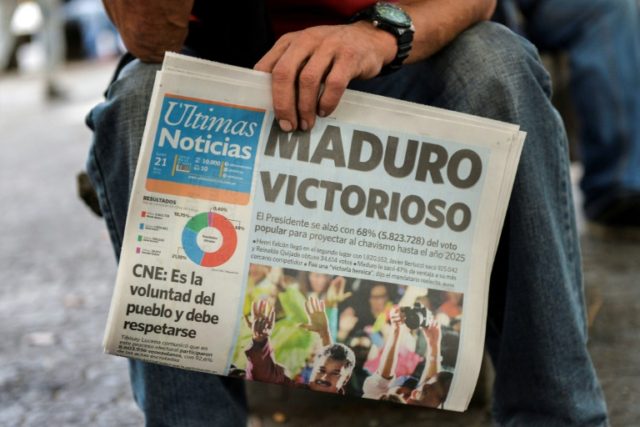Venezuela’s National Telecommunications Commission (Conatel) has launched a “sanctioning procedure” against El Nacional, one of the nation’s oldest newspapers, accusing the outlet of “promoting hate” and “contempt against legitimate authorities.”
El Nacional, founded in 1943, has remained one of the most consistent mainstream sources of critical coverage of the socialist chavista regime throughout the Hugo Chávez era and into dictator Nicolás Maduro’s tenure. This weekend, it published a scathing editorial condemning the presidential “election” on Sunday, in which Maduro banned the presence of opposition candidates, arguing Maduro, “If he had any shame left, should be hiding under his bed without daring to peek out his nose.”
El Nacional stands accused of violating the Law of Social Responsibility in Radio, Television, and Electronic Media and the Law Against Hate for Peaceful Coexistence and Tolerance, both Maduro regime fabrications intended to allow the prosecution of anti-socialist voices.
The newspaper published the text of the complaint against them, which lists among its alleged crimes “disseminating messages in contempt of legitimately constituted authorities and inciting and promoting hate.” The complaint describes the action as a “sanctioning procedure” against the newspaper and orders El Nacional to “abstain from publishing news and messages that could damage the peace of the citizenry, [or] generate agitation in the population, by offering erroneous or unfounded information that, as a result, infringes the provisions” in the statutes listed.
The complaint gives El Nacional ten days to put together an affirmative defense against the complaints but five days to declare itself in opposition to the measures. In other words, the government will provide the newspaper twice the time to prepare a statement admitting to a legal violation than if it asserts that it has done nothing wrong.
El Nacional is one of the nation’s largest newspapers, with an 80,000-home circulation on weekdays and 200,000-home circulation on Sundays, according to estimates from 2013, when it turned 70 years old. El Nacional has typically described itself as an independent, objective newspaper, not aligning with any particular ideology. In 2013, the newspaper’s owner Miguel Henrique Otero said of El Nacional, “We are a medium committed to the country, with democratic values and, above all, values in support of responsible journalistic practices.”
On Wednesday, Otero dismissed the Conatel sanction as “an arbitrary measure by the government and, without a doubt, an act of political retaliation.” He warned that, following Maduro’s “reelection” on Sunday, “persecution against the independent press of the country will deepen” and dismissed the regime as “desperate” for trying to silence his newspaper.
The editorial board of El Nacional ridiculed Sunday’s election, which most free countries condemned as fraudulent and not representative of the will of the Venezuelan people, over 80 percent of which did not participate.
“What happened yesterday in the presidential elections … is a failure of such magnitude by Nicolás that, if he had any shame left, he should be hiding under his bed without daring to peek out his nose,” the editorial reads. “Yet the foreign machine that politically and publicity-wise has created such a universal embarrassment will force him to show his face, even if they have to push him out there. A worse disgrace is impossible for a politician who even his closest allies describe behind his back as ‘a bit limited in his understanding’ and to whom it is wise to speak slowly and, if possible, with easy-to-digest sentences.”
“What happened yesterday is more than illuminating and, beyond that, historic. It is like those days where the tide ebbs and lets you see all the garbage that the water was hiding,” the editorial concludes. “Citizens have protested peacefully before a monstrosity that wanted to impose itself through an election model, they have ebbed so as to not contaminate themselves and submerge themselves in these immense waves of shit.”
The Conatel sanction is far from the first time that the Maduro regime has tried to silence unfavorable media. Diosdado Cabello, one of Maduro’s top henchman and one of Latin America’s most prominent drug lords, sued the outlet for defamation for covering the extensive evidence suggesting he is one of the leaders of the Cartel de los Soles, a transcontinental cocaine trafficking organization. Cabello lost a similar lawsuit against the Wall Street Journal in the United States.
So far in 2018, the Maduro regime has forced the shutdown of seven media outlets, most local newspapers that documented violence against protesters. Maduro has also forced international media outlets, including CNN, to leave the country following coverage that he deemed insufficiently favorable to him.

COMMENTS
Please let us know if you're having issues with commenting.